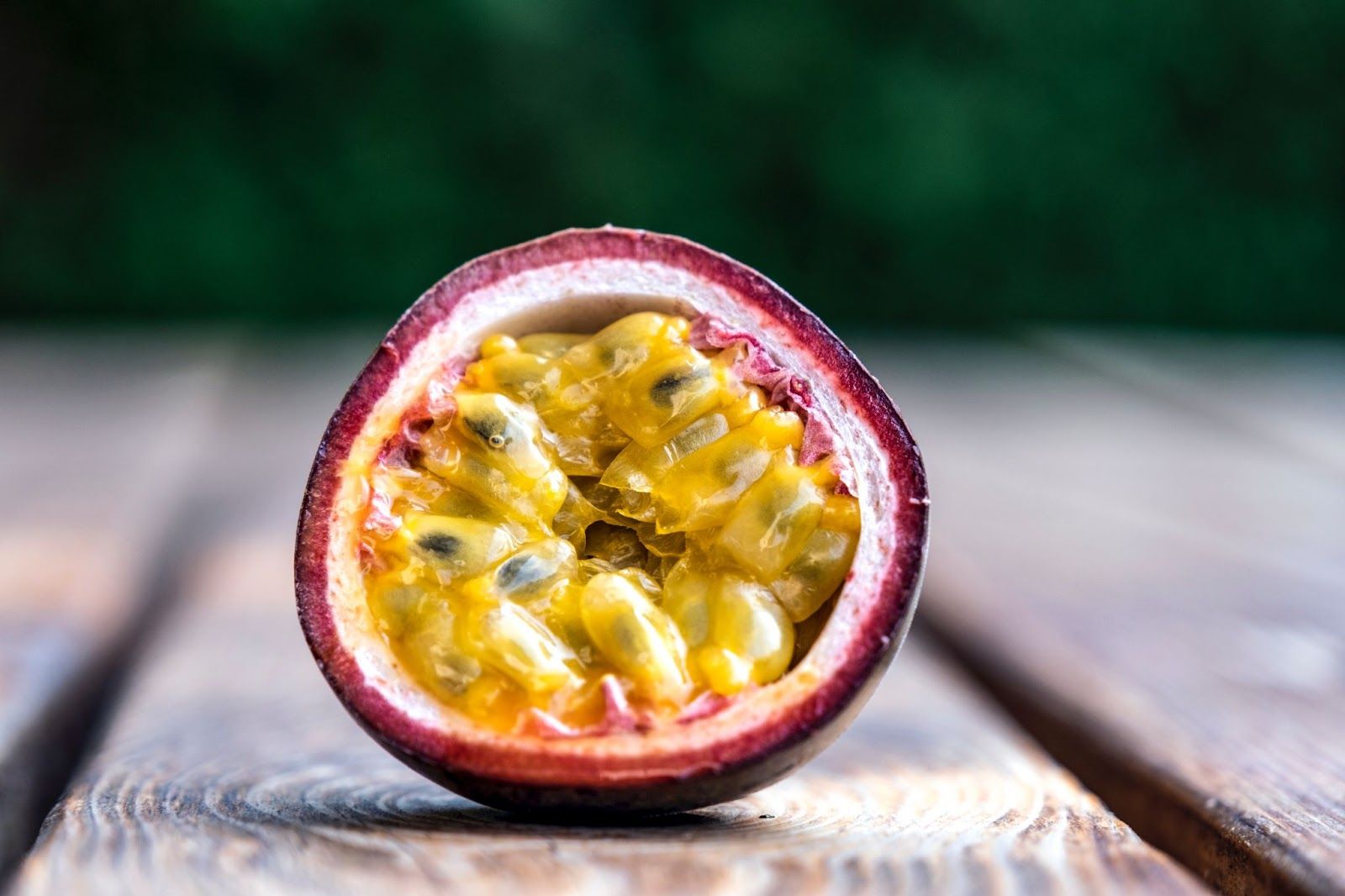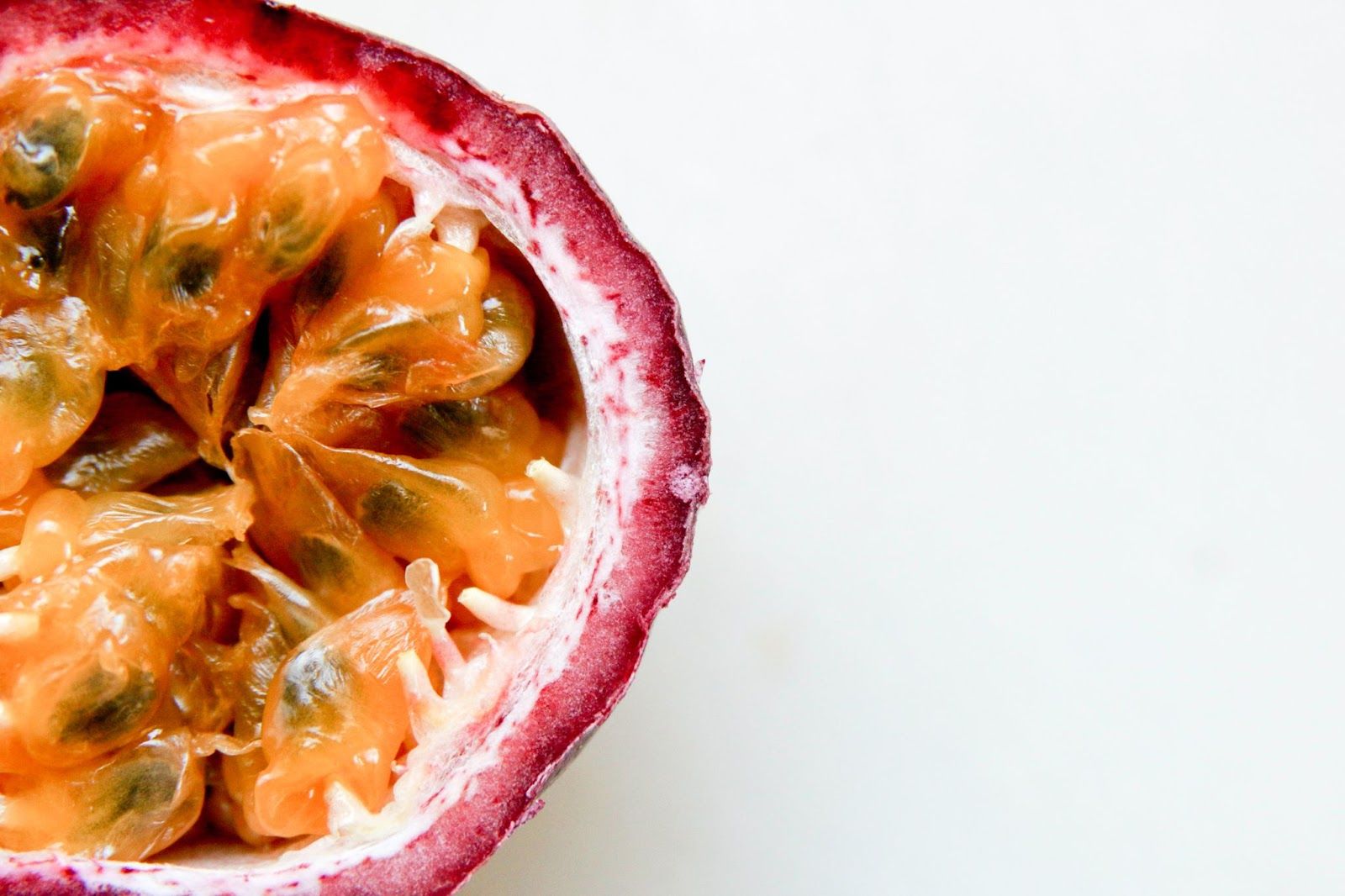Before you start feeding your pup passion fruit as a healthy sweet treat, let’s see if passion fruit is really ok for dogs to eat.

Is Passion Fruit Poisonous to Dogs?
Have you ever eaten passion fruit? It’s a delicious and juicy tropical fruit with vibrant colors. There’s no other fruit that tastes quite like it. But it’s most closely comparable to the combination of sweet and tart found in pineapples and kiwis.
There are multiple varieties of passion fruit, but the purple and yellow-skinned ones are the most common. “Despite its small size, it’s rich in antioxidants, vitamins, and plant compounds that could benefit your health.” Passion fruit is a great source of fiber, vitamins A and C, iron, and potassium.
But keep in mind that too much of any kind of fruit can cause your dog to have stomach upset because of the high sugar content, and sometimes even because of the high fiber. Keep reading below to find out about the danger of the seeds and rind of a passion fruit for dogs.
Is There Cyanide in Passion Fruit?
“Purple passion fruit skin may also contain chemicals called cyanogenic glycosides. These can combine with enzymes to form the poison cyanide and are potentially poisonous in large amounts. However, the fruit’s hard outer skin isn’t usually eaten and generally considered inedible.”
Not only should you remove the skin before feeding any passion fruit to your dog because of the cyanide, you should also remove it because it’s not highly digestible. And it could cause a choking hazard or become an intestinal blockage.
Some articles online will claim that the passion fruit seeds contain cyanide, like the seeds in apples. But according to Healthline.com, the seeds are safe and edible for people to eat. Whether or not the seeds contain any cyanide, it’s always best to remove all seeds from any fruit before feeding it to your precious pup to avoid any potential choking hazards.
If your dog has eaten any of the seeds or rind from passion fruit, watch out for the signs of poisoning in dogs. And it’s best to give your veterinarian a call, just to be safe.

Is Unripe Passion Fruit Poisonous?
Unripe passion fruit is also considered to contain cyanogenic glycosides—leading to the same poisonous cyanide found in the skin, and potentially in the seeds. So please make sure that if you are considering eating passion fruit, or you’re thinking about feeding it to your dog, that you only use fully-ripened passion fruit.

What is the Most Toxic Fruit to Dogs?
Grapes are definitely the most toxic fruit for dogs to eat. You’ve probably always been told to never let a dog eat chocolate because it’s poisonous for them. But did you know that grapes are just as dangerous for dogs as chocolate?
“Grapes and raisins are known to be highly toxic to dogs, though research has yet to pinpoint exactly which substance in the fruit causes this reaction.” Grapes are so toxic that they can cause acute sudden kidney failure. So it’s important to contact your vet if your dog has eaten any grapes, especially in large amounts.
What are Safe Fruits for Dogs to Eat?
Some fruits are pretty black and white when it comes to dog safeness. And others may not be considered toxic, but really aren’t the healthiest. Or contain seeds and leaves that are toxic to dogs—and are best to be left alone.
Below is a list of safe and non-safe fruits for dogs to eat. And remember—everything in moderation. Any treat for your dog should only make up 10% of their overall diet. Even the safest, healthiest fruits for dogs should only be given in small amounts: without the seeds, skin, or rind, and in small, cut up pieces.
Fruits Dogs Can Eat:
- Apples
- Bananas
- Blueberries
- Cantaloupe
- Cranberries
- Cucumbers
- Mangos
- Oranges
- Peaches
- Pears
- Pineapple
- Raspberries
- Strawberries
- Watermelon
Fruits Dogs Can’t Eat:
- Avocados
- Cherries
- Grapes & Raisins
- Tomatoes
Is it OK for Dogs to Eat Passion Fruit?
While passion fruit isn’t considered poisonous to dogs, the seeds may contain cyanide, the rind definitely contains cyanide, and the unripened version also contains cyanide. So it’s really best to just avoid feeding passion fruit to your pup altogether.
Honestly, there are so many other safe and healthy fruits for dogs listed above. Why not pick one that you know will be a great option for your dog? There are more than enough options that they will absolutely love!
For more helpful articles about pet-parenting tips, check out the Off Leash blog at TryFi.com.
Want to know more about TryFi.com? The Fi Dog Collar is a GPS tracking collar that not only keeps track of your dog’s location, activity levels, and sleep patterns, but it also alerts you if your dog escapes your backyard. This is the fastest way to find your dog after an escape. Try the Fi Dog Collar today!




